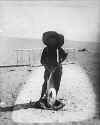| The Wrights began to build the glider in August, making some of the parts in
Dayton. Others, they decided to make once they arrived at Kitty Hawk. Wilbur went south in
early September, followed by Orville several weeks later. With the help of Bill Tate, who
had grown as enthused about the enterprise as the brothers, they flew the craft as a kite
to measure its performance. Within three days they experienced the first of many
accidents, completely smashing the right side of the glider. After repairs, they resumed
testing, sometimes letting Tom Tate, Bill’s young nephew, ride the glider while they
controlled it with ropes from the ground. Finally, in mid-October, they began making
manned glides with Wilbur at the controls. The results were both encouraging and
confusing. The controls seemed to work well -- well enough that they removed
the tail at some point. They wing warping and horizontal elevator were sufficient
to balance the glider in the air, or so they believed. But the craft generated a good deal less lift
than Wilbur had calculated using Lilienthal’s data. Still, they were able to make
glides of 300 to 400 feet, just barely surpassing the performance of the 1896 Chanute
glider. Thus encouraged, they went back to Dayton in late October, already planning an
improved glider for next year.

|
Click on a
photo to enlarge it.

The 1900 Wright Glider
being flown as a kite. The tail has been removed.

The wreck of the 1900 glider.

Tom Tate and a fish almost as large as himself. The
glider is behind him.
|
![]()
![]()
![]()
![]()